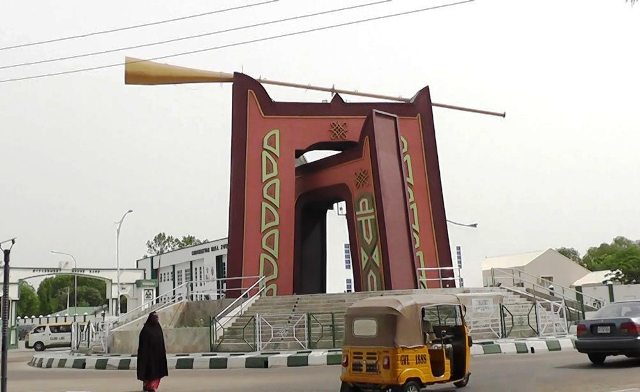Judiciary
Kano gets first female Chief Judge, Dije Aboki

Gov. Abba Yusuf of Kano State has sworn in the first female Chief Judge of the state, Justice Dije Audu Aboki, with an appeal for support from the judiciary.
Yusuf urged the judiciary to support his administration’s demolition and anti-graft policies to enable it to recover public assets allegedly acquired illegally by the immediate-past administration in the state.
He spoke on Monday while swearing in the first female Chief Judge in the state at Africa House, Government House, in Kano.
The governor explained that his administration’s desire of demolishing illegal structures and recovering public properties was for the development of the state.
Yusuf wondered why the Abdullahi Ganduje administration could demolish schools, hospitals and other public places only to build shopping complexes for businesses.
He described the relationship between the judiciary, legislature and executive as not competitive, but complementary, promising to continue to maintain cordial relationships amongst the three arms of government.
The governor noted that Justice Aboki has paid her dues in the temple of justice and through experience, talent and patriotism is by the grace of God elevated as the Chief Judge of the state.
“While I congratulate you on this well-deserved appointment, may I also remind my Lord that this task is a daunting one which calls for total dedication and commitment for the peace, progress and stability of Kano state and Nigeria at large.
“Having spent your public life within this sector, no one can lecture you on what the citizens expect from you as the Head of this very important Arm of Government,” he said.
Yusuf enjoined Aboki not only to see her elevation as a call to duty but also as a trust invested in her by God to represent Him in the affairs of men.
The governor said she was assuming duty when the state was operating financial autonomy of the three arms of government, including the Judiciary.
He, therefore, charged Justice Aboki to take advantage of all the latitude that this autonomy provides to ensure that judiciary staff are well trained while the day-to-day running of the courts is seamless.
“You can count on the support of the Executive Arm of Government and the Legislature to work with you in helping you cultivate a cordial working relationship with the staff,” he assured.
Yusuf also drew the attention of the new chief judge to the challenges with the speedy dispensation of justice particularly as it involves some suspects that are arraigned for violent crimes.
“It is our view that when such cases are dealt with expeditiously and those found guilty are punished, it will deter others hoping to engage in criminal acts,” said the governor.
Besides, he advised her to beware of those who want to corrupt, confuse, intimidate or blackmail the judiciary to do their bidding.
Yusuf however expressed optimism that the present leadership is very capable of withstanding and maintaining the sanctity of the Temple of Justice and the Legal profession in the state.
Responding, Justice Aboki said she was grateful to God for the opportunity to serve and the privilege to be elevated to the position of Chief Judge of the state.
She promised to serve with “integrity, honesty and justice” as well as do her best to ensure that the rule of law is adhered to at all times.
“We will restore the lost glory of the judiciary in our state,” pledged the new chief judge.
Justice Aboki also said she was aware of the challenges in the Judiciary and appealed for support and collaboration from the executive and legislative arms to succeed.
She also solicited the support of the Justices, other judicial staff and professional bodies to meet the desired objectives of delivering justice.
(NAN)
Judiciary
Court discharges man accused of burning father’s house in Abuja

A Chief Magistrates’ Court in Bassa, Abuja, on Friday discharged a 28-year-old man, Hamza Azizz, who was accused of setting his father’s house on fire in Bassa Village.
The Chief Magistrate, Abdulrazaq Eneye, released the defendant after he had spent three weeks at the Kuje Correctional Center.
Eneye also ordered Azizz to undergo counselling and warned him against committing similar offences in the future.
“The court can now discharge you into society after assessing your mental state through the correctional center,” the magistrate ruled.
Azizz expressed remorse for his actions, pleaded for leniency, and vowed to stay away from drugs.
The prosecution counsel, Mr A. Aliyu, told the court that the defendant had poured kerosene on his father’s body before also dousing the house with kerosene and setting it ablaze.
The father later reported the incident to the police in Bassa Village.
Azizz was charged with mischief and criminal intimidation, offences that contravene Sections 327 and 397 of the Penal Code.
Judiciary
Nnamdi Kanu apologises over attacks on judge, others

Nnamdi Kanu, the leader of the proscribed Indigenous People of Biafra (IPOB), on Friday, tendered an apology over his recent attacks on the Federal High Court and Justice Binta Nyako.
Kanu, through his new counsel and former Attorney-General of the Federation (AGF) and Minister of Justice, Chief Kanu Agabi, SAN, also apologised to the Federal Government’s lawyer, Chief Awomolo, SAN.
The IPOB leader equally apologised to his team of lawyers earlier led by Aloy Ejimakor for also attacking them while before Justice Nyako.
Kanu tendered the apology through his lead counsel, Chief Agabi, before Justice James Omotosho, the new trial judge.
Upon resumed trial, Agabi sought the court’s permission to deliver a message on Kanu’s behalf.
He said he had already discussed the development with the lawyer to the prosecution and Justice Omotosho granted the application.
The News Agency of Nigeria (NAN) reports that Justice Omotosho had fixed March 21 for the trial of Kanu.
The judge fixed the date after the case file was transferred to him.
Kanu, who was brought back to the country in June 2021 from Kenya, was expected to take his plea as the case begins afresh (de novo).
NAN reports that the Chief Judge (CJ) of FHC, Justice John Tsoho, had, in a letter dated March 4 and addressed to Kanu’s lead counsel, Mr Aloy Ejimakor, communicated the re-assignment of the case from Justice Binta Nyako to Justice Omotosho.
The re-assignment followed the demand by Kanu and his team of lawyers for the transfer of the seven-count terrorism charge to another judge, after alleging bias.
Justice Nyako, on Sept. 24, 2024, withdrew from the case and sent the case file to the CJ of FHC for re-assignment.
The judge said she could not proceed with a trial where a defendant lacked confidence in the court.
However, the CJ sent Kanu’s case file back to Justice Nyako for adjudication, insisting that a formal application must be made by the defence before the recusal could be accepted.
But Kanu and Ejimakor, on Feb. 10, insisted that Justice Nyako no longer had jurisdiction to preside over the case after her recusal (withdrawal) from the matter, prompting the judge to adjourned the case indefinitely (sine die).
NAN reports that Justice Ahmed Mohammed (who has been elevated to Appeal Court) and Justice Tsoho (before becoming the CJ) had presided over Kanu’s trial before it was assigned to Justice Nyako, following the defendant’s rejection of the two judges.
Headlines
Supreme Court nullifies Rivers LG elections

The Supreme Court on Friday, nullified the Local Government election in Rivers State, which was conducted on Oct. 5, 2024.
A five-member panel of the apex court unanimously held that the election was conducted in violation of relevant laws.
Justice Jamilu Tukur, in the lead judgment, agreed with the appellant, the All Progressives Congress (APC), that conditions precedent were not complied with before the Rivers State Independent Electoral Commission (RSIEC) held the election.
Justice Tukur held that there was no evidence that the voters’ registration continued until 90 days before the election and that the requisite notices were issued as required by law.
-

 Headlines4 years ago
Headlines4 years agoFacebook, Instagram Temporarily Allow Posts on Ukraine War Calling for Violence Against Invading Russians or Putin’s Death
-

 Headlines4 years ago
Headlines4 years agoNigeria, Other West African Countries Facing Worst Food Crisis in 10 Years, Aid Groups Say
-

 Foreign4 years ago
Foreign4 years agoNew York Consulate installs machines for 10-year passport
-

 News1 year ago
News1 year agoZero Trust Architecture in a Remote World: Securing the New Normal
-

 Entertainment3 years ago
Entertainment3 years agoPhyna emerges winner of Big Brother Naija Season 7
-

 Headlines1 year ago
Headlines1 year agoNigeria Customs modernisation project to check extortion of traders
-

 Entertainment2 years ago
Entertainment2 years agoMovie download platform, Netnaija, announces closure
-

 Economy2 years ago
Economy2 years agoWe generated N30.2 bn revenue in three months – Kano NCS Comptroller











